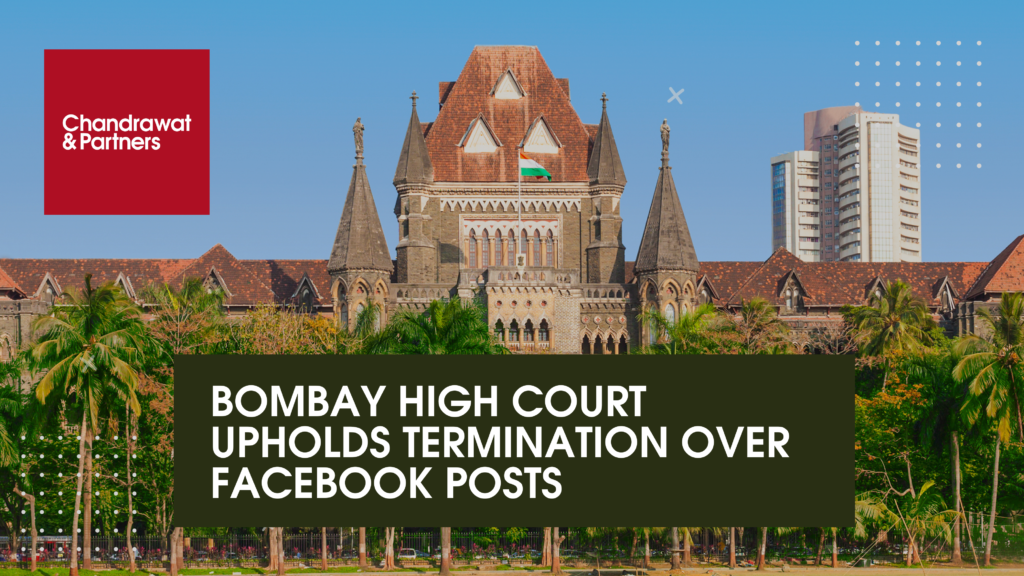Share :
Introduction
In a recent legal development that has significant implications for the intersection of freedom of speech and workplace conduct, the Bombay High Court rendered a decisive judgment in the case of Hitachi Astemo Fie Pvt. Ltd. v. Nirajkumar Prabhakarrao Kadu. The case revolves around the termination of Mr. Kadu, an employee and union office bearer at Hitachi Astemo Fie Pvt. Ltd., a prominent auto parts manufacturer. The termination was grounded in contentious Facebook posts made by Mr. Kadu, raising pertinent questions about the limits of freedom of speech and expression within the confines of employment.
Background
Employment History and Allegations: Mr. Kadu, acting in his capacity as a union office bearer, actively participated in various forms of agitation during wage settlement negotiations. The controversy unfolded when he posted two allegedly defamatory Facebook messages in 2017, which were deemed to incite violence and animosity towards the company’s management.
Labour Court’s Decision: The initial response from the Labour Court in Pune was to set aside the charge sheet and inquiry as illegal. Dissatisfied with this outcome, Hitachi Astemo Fie Pvt. Ltd. pursued a writ petition to challenge the Labour Court’s decision.
BOMBAY HIGH COURT’S OBSERVATIONS
Freedom of Speech and Expression: Justice Milind N Jadhav, delivering the judgment, underscored the significance of imposing reasonable boundaries on freedom of speech and expression. The court emphasized that unchecked expressions, particularly in a workplace setting, could lead to severe consequences, necessitating a proactive approach to prevent potential harm.
Legal Analysis of Facebook Posts: The court meticulously examined the two Facebook posts in Marathi and determined them to be defamatory, with an apparent intent to incite hatred and passion against the company’s management. The court dismissed claims of a hacked account, emphasizing the heightened sensitivity of the atmosphere during wage negotiations.
Misconduct and Model Standing Orders: The court concluded that Mr. Kadu’s conduct fell within the provisions of ‘commission of misconduct’ as outlined in relevant clauses of the Model Standing Orders. It upheld the fairness of the inquiry and the findings of the Enquiry Officer, thereby overturning the Labour Court’s initial decision.
IMPLICATIONS AND FUTURE PROCEEDINGS
The implications of this ruling are far-reaching, as it serves as a potent deterrent against provocative acts by office bearers of recognized unions during sensitive negotiations. The Bombay High Court directed the Labour Court in Pune to expedite the hearing on the remaining issues within eight months, thereby setting a clear timeline for resolution.
Conclusion
The judgment in Hitachi Astemo Fie Pvt. Ltd. v. Nirajkumar Prabhakarrao Kadu underscores the delicate equilibrium between the fundamental right of freedom of expression and the concomitant responsibilities of employees, particularly those holding union offices, during critical negotiations. This landmark case stands as a precedent, providing nuanced insights into delineating the boundaries of expression in the contemporary workplace, especially in the era of pervasive social media use. Organizations and employees alike are compelled to navigate this delicate balance with a heightened awareness of the potential legal ramifications.
For further legal insights, updates, and inquiries related to employment law or workplace rights, individuals are encouraged to consult with legal experts who specialize in this domain.
For more information or queries, please email us at
enquiries@chandrawatpartners.com




